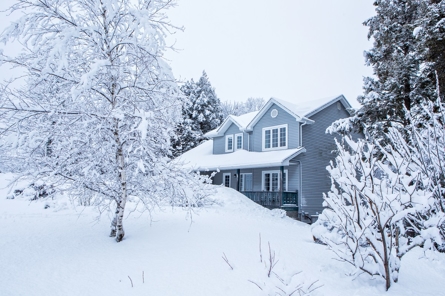
The holiday season can be busy. With so much to do – from cleaning and cooking to holiday shopping and entertaining – it’s easy to forget about winter weather safety and home maintenance. Don’t wait until it’s too late. Follow these easy cold-weather preparation tips from the experts at ServiceMaster Restore to winterize your home and help keep everyone safe.
Outdoor winter weather safety
Use these tips to protect the exterior of your home from harsh winter conditions:
Turn off all exterior faucets
To help prevent undrained water in your pipes from freezing, disconnect all the garden, pool and hot tub hoses. Drain any remaining water in the faucets. Then, turn off the water flow to all outdoor faucets from the main shut-off valve, especially if your attachments aren’t weatherproof. Frozen faucets and burst pipes can lead to plenty of damage and hefty repair costs.
Close crawl space vents
If you keep your crawl space vents open during warmer months, close them before temperatures drop. That way, you can help keep cold air from entering your home and save money in heating bills.
Inspect the roof
Look for damaged or loose shingles that can lead to leaks. Leaks contribute to mold growth, which can pose a health risk to your family and any holiday visitors. While you’re inspecting your roof, check to ensure that the gutters aren’t blocked by debris, and that all the downspouts direct water away from the home. If snow or rain has a chance to pool near your home’s foundation, it can cause cracks that may allow moisture to seep into your basement or crawl space, putting your home at risk for water damage and mold growth.
Prevent ice dams
A combination of air leaks and poor insulation can contribute to the formation of ice dams on the roof. Not only is it extremely dangerous to have a heavy collection of sharp icicles hanging from your roof, ice dams can damage gutters and downspouts. They can also trap meltwater on your roof, which can seep under your shingles and potentially cause water damage or mold growth.
Indoor cold-weather preparation tips
Winterize your home from the inside to help keep your house safe this season:
Make an emergency kit
Winter weather can be severe. Sometimes, the power may go out. Other times, you may be stranded for hours or days at a time until winter storms pass. To help you through these instances, make an emergency kit stocked with all the essentials you’d need if you have to bunker down and stay put for a few days. Some items you may want to include are flashlights, batteries, emergency radios, nonperishable food and water.
Test your smoke alarms
According to the U.S. Fire Administration (USFA), home fires occur more in winter than any other season. To help ensure that you and your family can react quickly if a fire breaks out in your home, double check your fire alarms and smoke detectors. Use the test buttons to ensure everything is working properly, and change out the batteries if you haven’t already done so within the past 12 months.
Call a chimney sweep
According to the Consumer Product Safety Commission (CPSC), an average of 22,300 fires occurred between 2012 and 2014 due to fireplaces, chimneys and chimney connectors alone, resulting in an average of millions of dollars’ worth of property damage and loss. To help reduce your risk, follow chimney fire safety by having your chimney inspected by the professionals before you use your fireplace or wood burning stove for the first time this year. A chimney sweep can remove any flammable creosote build-up, as well as ensure that the structural integrity of your chimney is still sound.
Inspect your HVAC
Before you start using your heater this year, have your HVAC unit inspected. A professional inspection includes an assessment of your ducts, equipment and indoor air quality, as well as testing for deadly carbon monoxide leaks or air circulation issues. Depending on the results of your HVAC inspection, the professionals may ask you to take more preventative steps, like improving the air quality, to help winterize your home.
Change the HVAC filters
In general, air filters should be replaced every 6 to 12 months – more often if your home has pets or other allergens. Regularly switching out the filters helps reduce the spread of dust, dirt and allergens around the home, helping your loved ones breathe clean, healthy air throughout the season.
With the above winter weather safety tips in mind, you and your home will be better equipped to handle whatever the season throws at you. In the unfortunate event that the unthinkable does occur, contact the experts at ServiceMaster Restore. Available 24/7 every day of the year, we can help guide you from crisis to resolution as quickly as possible.
